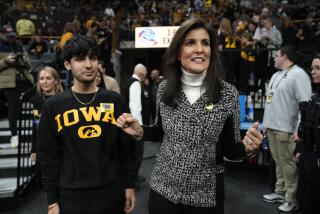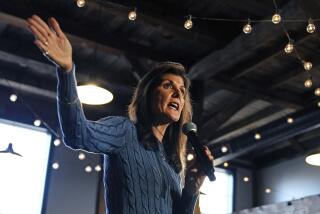Mississippi governor backpedals on racial remarks
- Share via
Reporting from Washington — Republican Gov. Haley Barbour of Mississippi tried Tuesday to snuff out a racially charged brush fire of his own making that threatened to harm a potential 2012 presidential run.
Barbour’s damage-control effort followed recent comments in a magazine interview in which he praised the white Citizens Council in his hometown of Yazoo City for helping to integrate local public schools without violence during the civil rights era.
“You heard of the Citizens Councils? Up north they think it was like the KKK. Where I come from it was an organization of town leaders,” Barbour told the Weekly Standard. “We didn’t have a problem with the Klan in Yazoo City.”
Barbour, 63, backpedaled after a flurry of criticism. Historians pointed out that the councils — sometimes called the “white-collar Klan” — had carried out deliberate campaigns of anti-black harassment, including in Yazoo City.
In an attempt to quell the controversy, the governor released a statement condemning the Citizens Council.
He said the council was “totally indefensible, as is segregation. It was a difficult and painful era for Mississippi, the rest of the country, and especially African Americans who were persecuted in that time.”
For Barbour, a onetime Republican National Committee chairman and Reagan White House political aide, the danger is that his remarks on race will become part of the narrative of any future presidential run.
Earlier this year, he came to the defense of a fellow Southern Republican, Gov. Bob McDonnell of Virginia, after McDonnell issued a Confederate History Month proclamation that failed to mention slavery. Barbour said McDonnell’s critics were “trying to make a big deal out of something [that] doesn’t amount to diddly.”
In the Weekly Standard interview, Barbour said of his upbringing during the height of the civil rights struggle: “I just don’t remember it as being that bad.” He said he went to hear the Rev. Martin Luther King Jr. address an integrated crowd at the local fairgrounds in 1962 but doesn’t remember what King had to say because he was on the edge of the crowd, “watching the girls, talking, doing what boys do. We paid more attention to the girls than to King.”
Political scientist Merle Black, a specialist in Southern politics, said Barbour needed “to kill this issue, because if that becomes the issue that defines his campaign, then he’s really going nowhere.”
But he also said that Barbour was speaking of a period when he was not yet out of high school, and he suggested that the governor’s national reputation was unlikely to suffer serious permanent damage unless he continued to make racially insensitive remarks.
As politicians have tried to take the measure of a large field of potential Republican presidential candidates, some have pointed to Barbour’s thick Mississippi accent as a possible vulnerability, since it has the potential to trigger anti-South bias from voters in other parts of the country. But Barbour’s background as one of Washington’s most successful lobbyists is usually mentioned as a much larger threat to his chances.
Republicans defended Barbour but said he must choose his words more wisely.
“The reality of 2010 is that there are certain sensitivities in national politics that exist, and you have to tread very carefully,” said Craig Shirley, a longtime conservative strategist. “Southerners, especially Southern Republicans, fairly or not, are held to a different standard.”
Whit Ayres, a Republican consultant who has worked extensively in both Southern and national campaigns, called the incident “a tempest in a teapot.”
“No one thinks that Haley is anything other than utterly and completely fair-minded,” Ayres said.
Emory University history professor Joseph Crespino, who has written about white resistance to civil rights in his native Mississippi, said Barbour was correct when he said that the Citizens Councils, composed of local white businessmen and professionals, may have helped reduce the influence of the Ku Klux Klan in communities like Yazoo City.
“They didn’t want the grubby Klan in their town,” he said.
But at the same time, he said, the councils did a “very effective job” of keeping blacks in line, while turning a blind eye to racially motivated white-on-black violence. After the U.S. Supreme Court outlawed school segregation in 1954, the Citizens Council in Yazoo City took out a full-page ad in the local newspaper to publicize the names of local black families that had become plaintiffs in a lawsuit to integrate local schools.
As a result, all the blacks who were named in the ad “suffered some form of economic harassment or were run out of town, including some who were military veterans,” Crespino said.
More to Read
Sign up for Essential California
The most important California stories and recommendations in your inbox every morning.
You may occasionally receive promotional content from the Los Angeles Times.













